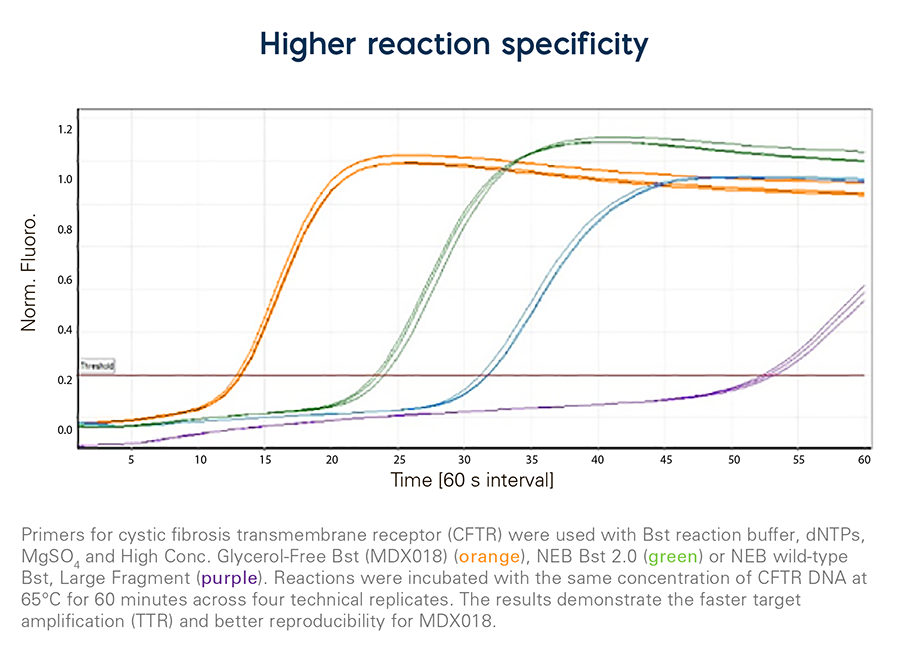High Conc. Glycerol-Free Bst
High Conc. Glycerol-Free Bst is an enzyme derived from the large fragment of Bacillus stearothermophilus DNA Polymerase I. It contains 5´- 3´ DNA polymerase activity and strong strand displacement activity but lacks 5´- 3´ exonuclease activity. The strong strand displacement activity enables Bst DNA Polymerase to synthesize DNA at a constant temperature making it an ideal enzyme for isothermal amplification, including HDA, MCA and, Loop-Mediated Isothermal DNA Amplification (LAMP).
Have questions about a product?
Contact us to learn more about Meridian’s molecular or immunoassay reagent portfolio. We want to hear from you!

High Conc. Glycerol-Free Bst, MDX018
High concentration glycerol-free DNA polymerase (exo-), with strand-displacement properties. used for Isothermal DNA amplification such as LAMP (Loop-mediated Isothermal Amplification).
Documents & Resources
Description
High Conc. Glycerol-Free Bst (100 U/µL) is supplied with an Enzyme Dilution Buffer and a Bst Reaction Buffer formulated to deliver the fastest amplification speed (time-to-results), yield, salt tolerance, and sensitivity, speeding up your product development time and allowing you to commercialize your new products faster. High Conc. Glycerol-Free Bst is also lyophilization-compatible, making it ideal for the development of point of care test (POCT) assays that require ambient temperature shipping and storage.
Specifications
| Description | High concentration glycerol-free DNA polymerase (exonuclease minus), with strand-displacement properties. Bst DNA Polymerase is used for Isothermal DNA amplification and LAMP (Loop-mediated Isothermal Amplification). |
| Concentration | >100 units/µL measured against a standard |
| Appearance | Clear, colorless solution |
| Application | Loop-mediated isothermal amplification |
| Sample type | cDNA, DNA |
| Presentation | 3 vials |
| Storage | -20 °C |
| Enzyme Stability | See outer label |
| Assay Stability | Up to 24 months at ambient temperature following air-drying or lyophilization |
| DNase/RNase Contamination | No detectable degradation |
Catalogs & Brochures
Lyo-Ready LAMP Mix, 4xLyo-Ready LAMP Mix, 4x
Lyo-Ready RT-LAMP 1-Step Mix, 4xLyo-Ready RT-LAMP 1-Step Mix, 4x
Air-Dryable DNA LAMP & Air-Dryable RNA/DNA LAMP Mix, 4xAir-Dryable DNA LAMP & Air-Dryable RNA/DNA LAMP Mix, 4x
A Comprehensive Guide to Essential Reagents for High-Throughput Molecular Diagnostic Assays (MDx)Accelerating Efficiency: A Comprehensive Guide to Essential Reagents for High-Throughput Molecular Diagnostic Assays (MDx)
FAQs: High Conc. Glycerol-Free Bst
The main difference between loop mediated isothermal amplification (LAMP) and qPCR is that in a LAMP test, the amplification is achieved using a single constant temperature, while in the qPCR, amplification requires cycling between multiple temperatures on a thermocycler. Instead of melting DNA strands apart at high temperatures, loop mediated isothermal amplification uses polymerases with high strand displacement activity, like Bst DNA polymerases. As these polymerases do not need multiple temperatures, they can amplify a target in less than an hour, and in some cases in as little time as 10 minutes.
No Meridian’s Bst DNA Polymerase does not come with warm or hot start; instead, the reaction buffer does not contain magnesium and so the enzyme is completely inactive until magnesium is added. If you are concerned about setting your reaction up at room temperature, we recommend adding the magnesium last, just before running the experiment and it will prevent non-specific amplification.
Repeated freeze-thawing of Bst DNA polymerase will damage the enzyme due to crystal formation and so glycerol is normally added to prevent this crystal formation. Making the Bst high concentration also stops crystal formation, so that the glycerol can be removed, and this allows the Bst to be lyophilized.
Yes, it is possible to design a multiplex LAMP test using different primers and probes, however they can be difficult to design and optimize as each sequence requires three sets of primers.
No, the reaction temperatures are too high for enzyme stability.
Yes, Glycerol-Free Bst DNA Polymerase does have some reverse transcriptase activity, however for robust and consistent reactions we recommend the addition of a reverse transcriptase.
Get In Touch With A Specialist
Have questions about a product? Want to learn more about Meridian’s molecular or immunoassay reagent portfolio? We want to hear from you!